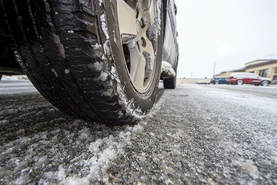
Montana 811 consistently strives to promote the message of safety to all stakeholders. Winter often brings severe storms and frigid temperatures. Stay safe and healthy by planning ahead. No matter how many Montana winters you’ve endured, keeping these important tips in mind will help you get safely through this winter:
Work Safely Outside
- When working near vehicular traffic, always wear the appropriate high visibility vests and set up your work zone with traffic controls identified by signs, cones, barrels, and barriers. Drivers may skid or lose control of their vehicles more easily when driving on snow and/or ice-covered roads.
- To prevent slips, trips, and falls, clear walkways of snow and ice, and spread deicer after a winter storm.
- Wear proper footwear when walking on snow or ice. A pair of insulated and water-resistant boots with rubber treads are ideal.
- Wear appropriate clothing such as layers of light, warm apparel, mittens, hats, scarves, etc. Make sure there are no loose straps or other articles which may be caught or snag in machinery or other devices.
- Take short steps and walk at a slower pace so you can react quickly to a change in traction, when walking on an icy or snow-covered walkway.
- Avoid overexertion, since cold weather puts an added strain on the heart. There is potential for exhaustion, dehydration, back injuries, or heart attacks.
Prepare Your Home
- Winterize your home.
- Install weather stripping, insulation, and storm windows.
- Insulate water lines that run along exterior walls.
- Clean out gutters and repair roof leaks.
- Check your heating systems.
- Have your heating system professionally serviced to make sure that it is working properly.
- Inspect and clean fireplaces and chimneys.
- Install a smoke detector. Test batteries monthly and replace them twice a year.
- Have a safe alternate heating source available.
- Protect your family from carbon monoxide (CO).
- Learn symptoms of CO poisoning: headache, dizziness, weakness, upset stomach, vomiting, chest pain, and confusion.
- Prevent CO emergencies by installing a CO detector to alert you of the presence of the deadly, odorless, colorless gas. Check batteries when you change your clocks in the fall and spring.
- Keep grills, camp stoves, and generators out of the house, basement, and garage.
- Locate generators at least 20 feet from the house.
- Leave your home immediately if the CO detector sounds and call 911.
- Stock food that doesn’t require cooking or refrigeration and water stored in clean containers.
Prepare Your Car
- Service the radiator and maintain the antifreeze level. Check your tire treads or, if necessary, replace tires with all-weather or snow tires.
- Keep gas tank full to avoid ice in the tank and fuel lines.
- Use a wintertime windshield washer formula.
- Prepare a winter emergency kit to keep in your car. The kit should include:
- cell phone, portable charger, and extra batteries;
- blankets;
- food and water;
- booster cables, flares, tire pump, and a bag of sand or cat litter (for traction);
- compass and maps;
- flashlight, battery-powered radio, and extra batteries;
- first-aid kit; and
- plastic bags (for sanitation).
Traveling During Winter
- Avoid traveling during winter storm or temperature advisories.
- If you must travel, inform a friend or relative of your proposed route and expected time of arrival.
- Follow these safety rules if you become stranded in your car:
- Stay with your car unless safety is no more than 100 yards away.
- Stay visible by putting bright cloth on the antenna, turning on the inside overhead light (when engine is running), and raising the hood when snow stops falling.
- Run the engine and heater only 10 minutes every hour.
- Keep a downwind window open.
- Make sure the tailpipe is not blocked.
- Watch for signs of frostbite and hypothermia. Do minor exercises to maintain good blood circulation in your body and to stay awake. Use blankets, newspapers, maps, and even the removable car mats for added warmth.
Above all, be ready to check on family and neighbors who are especially at risk from cold weather hazards such as young children, older adults, and the chronically ill. If you have pets, bring them inside. If you cannot bring them inside, provide them warm shelter and water to drink. Even if you take all of these precautions, the most important tip to follow when completing a winter project that requires any digging is to contact Montana 811 two business days in advance, excluding weekends and holidays, before you begin. Bring on the cold weather!
Sources: Occupational Safety and Health Administration. Go here for more information: http://bit.ly/2RiWOyX
Centers for Disease Control and Prevention. Go here for more information: http://bit.ly/2TPRViI